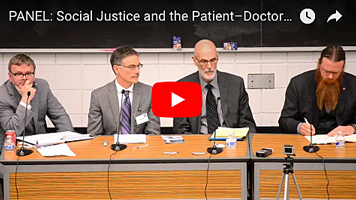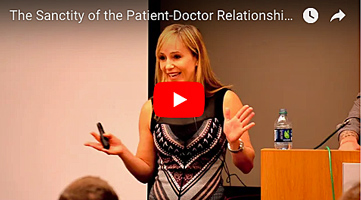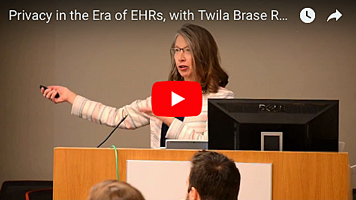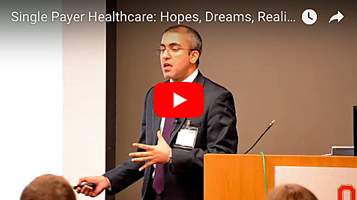PANEL: Social Justice and the Patient–Doctor Relationship
June 13, 2018 by
[et_pb_section bb_built=”1″ _builder_version=”3.0.106″][et_pb_row _builder_version=”3.0.106″][et_pb_column type=”1_2″][et_pb_video _builder_version=”3.5.1″ src=”https://youtu.be/aAEIofY0FnM” /][et_pb_text _builder_version=”3.5.1″]
Discussion Panel Focus: Does addressing matters of “social justice” and “population health” while caring for patients interfere with a doctor’s ethical responsibility to the patients he or she cares for?
Doctors are increasingly requested to handle social aspects of medical care.
Government programs, third-party insurance companies and other interest groups—in their efforts to promote quality healthcare for all – increasingly require doctors to perform more than the main medical functions for which they were trained. Doctors have an ethical responsibility to each and every patient. Do the tenets of “social justice” support this outcome?
[/et_pb_text][/et_pb_column][et_pb_column type=”1_2″][et_pb_cta _builder_version=”3.5.1″ background_color=”#2d9b8a”]
Representing that the tenets of social justice are not compatible with the ethical requirements of the patient-doctor relationship:
Dr. Robert S. Emmons is a Board Certified Psychiatrist / Neurologist – Clinical Neurophysiology practicing in Burlington, VT. Dr. Emmons graduated Summa Cum Laude, Luther College and is a Diplomate of the American Board of Psychiatry and Neurology.
Dr. Ryan Nash, MD, MA, FACP, FAAHPM, is the Director of The Ohio State University Center for Bioethics and Director, Division of Biomedical Education and Anatomy. He is an Associate Professor of Medicine and holds the Hagop Mekhjian, MD, Chair in Medical Ethics and Professionalism at the College of Medicine.
Representing that the tenets of social justice are compatible with the ethical requirements of the patient-doctor relationship:
Dr. Francis Blais is an infectious disease specialist in Columbus, Ohio. He received his medical degree from Philadelphia College of Osteopathic Medicine and has been in practice for more than 20 years.
Daniel Skinner, Ph.D., is Assistant Professor of Health Policy in the Department of Social Medicine at Ohio University Heritage College of Osteopathic Medicine, in Dublin, Ohio, Adjunct Assistant Professor in the Department of Pediatrics, The Ohio State University (at Nationwide Children’s Hospital), and Assistant Director of the Health Policy Fellowship.
MODERATOR: C. Alex Grieco is an Assistant Professor of Biomedical Education and Anatomy and an Assistant Professor of Radiology within the Ohio State University College of Medicine and is a part of the leadership team for the Clinical Applications component of the Lead-Serve-Inspire Medical Curriculum.
[/et_pb_cta][/et_pb_column][/et_pb_row][/et_pb_section]
The Sanctity of the Patient-Doctor Relationship—Jules Madrigal, MD
June 13, 2018 by
[et_pb_section bb_built=”1″ _builder_version=”3.0.106″][et_pb_row _builder_version=”3.0.106″][et_pb_column type=”1_2″][et_pb_video _builder_version=”3.5.1″ src=”https://youtu.be/ypkkdHIYZwI” /][et_pb_text _builder_version=”3.5.1″]
Dr. Juliette Madrigal speaks often and passionately about her cash-based Med-Peds practice in Texas. By eliminating 3rd party involvement from her practice, she is able to structure her time to allow for more 1-on-1 patient interaction, and offer better quality care at lower prices.
Third parties can be government regulations, government programs (Medicare), insurance companies, or any other entity that gets between a doctor and her patients, usually in the area of finance and payments, but often in critical decision making aspects of a patient’s healthcare.
[/et_pb_text][/et_pb_column][et_pb_column type=”1_2″][et_pb_cta _builder_version=”3.5.1″ background_color=”#2d9b8a”]
Jules Madrigal, MD is board certified in pediatrics and internal medicine. She completed her bachelor of science at the University of Texas at Austin while graduating Cum Laude. She received her Doctorate of Medicine at Texas A&M and finished her residency at the University of Oklahoma School of Medicine.
She currently serves on BRI’s board of directors.
[/et_pb_cta][/et_pb_column][/et_pb_row][/et_pb_section]
Privacy in the Era of EHRs—Twila Brase RN, PHN
June 13, 2018 by
[et_pb_section bb_built=”1″ _builder_version=”3.0.106″][et_pb_row _builder_version=”3.0.106″][et_pb_column type=”1_2″][et_pb_video _builder_version=”3.5.1″ src=”https://youtu.be/rt-HHROn19E” /][et_pb_text _builder_version=”3.5.1″]
Twila Brase, RN, PHN is an energetic spokesperson for patients’ rights and citizens’ rights in general. As an RN, she observed the gradual erosion of health freedom and saw that the loss of health freedom equates to overall loss of freedom.
In this video, Ms. Brase exposes areas where our privacy and freedoms are compromised and gives recommendations on how to counteract the rise of privacy infringement.
[/et_pb_text][/et_pb_column][et_pb_column type=”1_2″][et_pb_cta _builder_version=”3.5.1″ background_color=”#2d9b8a”]
Twila Brase, RN, PHN is president and co-founder of the Citizens’ Council for Health Freedom (CCHF), a patient-centered national healthcare organization based in St. Paul, MN. In 2009, Modern Healthcare Magazine named her #75 on the “100 Most Powerful People in Healthcare” list of healthcare leaders in America.
Ms. Brase is a speaker, author and program host of Health Freedom Minute on VCN America, also found on her own website, Citizens’ Council for Health Freedom. Her interview on BRI’s Next Generation Medicine podcast is scheduled for release in 2018.
[/et_pb_cta][/et_pb_column][/et_pb_row][/et_pb_section]
Single-Payer Healthcare: Hopes, Dreams, Realities—Sameer Lakha, MD
June 12, 2018 by
[et_pb_section bb_built=”1″ _builder_version=”3.0.106″][et_pb_row _builder_version=”3.0.106″][et_pb_column type=”1_2″][et_pb_video _builder_version=”3.5.1″ src=”https://youtu.be/d_wQ6K4PS7E” /][et_pb_text _builder_version=”3.5.1″]
A Canadian native, Dr. Sameer Lakha has first-hand experience of the much-touted Canadian healthcare system, and has a unique perspective on the realities of single-payer healthcare and how it impacts a doctor’s ability to practice medicine for the full benefit of the patient. Is single-payer all it’s cracked up to be? In this video, Dr. Lakha explores the hopes, dreams and realities of government healthcare.
[/et_pb_text][/et_pb_column][et_pb_column type=”1_2″][et_pb_cta _builder_version=”3.5.1″ background_color=”#2d9b8a”]
Sameer Lakha, MD is a distinguished scholar and doctor, receiving his undergraduate degree cum laude from Harvard University, and his MD with distinction in research from Icahn School of Medicine at Mt. Sinai, New York. He founded the Benjamin Rush Institute chapter at Icahn School of Medicine at Mt. Sinai.
[/et_pb_cta][/et_pb_column][/et_pb_row][/et_pb_section]
June 11, 2018 by
[et_pb_section bb_built=”1″ _builder_version=”3.0.106″][et_pb_row _builder_version=”3.0.106″][et_pb_column type=”1_2″][et_pb_video _builder_version=”3.5.1″ src=”https://youtu.be/c-ROknC85-E” /][et_pb_text _builder_version=”3.5.1″]
Dr. Graboyes illustrates how the private sector—in this case using the example of Musk’s Falcon Heavy rocket—can bring unimagined outcomes. In Falcon Heavy Health Care—What can we learn from Elon Musk and apply to healthcare?, Dr. Graboyes examines how Elon Musk’s Tesla roadster now orbits the sun, and two of the boosters that got it there performed a perfect, synchronized vertical landing straight out of 1950s sci-fi thriller.
Musk’s engineering and showmanship got world buzzing about the possibilities of space, with an excitement largely absent since the final moon landing in 1972. Importantly, Falcon Heavy demonstrated the value of competition and entrepreneurship in a field many had seen as a purely governmental endeavor. What can health care learn from this achievement?
[/et_pb_text][/et_pb_column][et_pb_column type=”1_2″][et_pb_cta _builder_version=”3.5.1″ background_color=”#2d9b8a”]
Dr. Robert Graboyes, PhD is Senior Research Fellow at the Mercatus Center at George Mason University. Author of “Fortress and Frontier in American Health Care,” his work asks, “How can we make health care as innovative in the next 25 years as information technology was in the past 25 years?” His work has taken him to Europe, Sub-Saharan African, and Central Asia. He has taught mid-career health care professionals in master’s and doctoral programs since 1999. and will be speaking on innovation in medical delivery.
[/et_pb_cta][/et_pb_column][/et_pb_row][/et_pb_section]
Renewed Trust: From Distributive Justice to Do No Harm in Medical Ethics—Robert S. Emmons, MD
June 11, 2018 by
[et_pb_section bb_built=”1″ _builder_version=”3.0.106″][et_pb_row _builder_version=”3.0.106″][et_pb_column type=”1_2″][et_pb_video _builder_version=”3.5.1″ src=”https://youtu.be/QsDABqQWpLU” /][et_pb_text _builder_version=”3.5.1″]
Robert S. Emmons, MD talks about the unintended consequences and negative effects of distributive justice and the patient-doctor relationship. Dr. Emmons’s thesis is that Distributive Justice has come to crowd out all other ethical values in everyday clinical practice, in an automatic, unconscious way, thus eroding trust between patients and physicians.
Doctors can restore that trust with patients by making Do No Harm an expression of humility and a central principle of ethical practice. Clinical experience tells us that outcomes improve in an environment of trust between patients and their doctors.
[/et_pb_text][/et_pb_column][et_pb_column type=”1_2″][et_pb_cta _builder_version=”3.5.1″ background_color=”#2d9b8a”]
Dr. Robert S. Emmons is a Board Certified Psychiatrist / Neurologist – Clinical Neurophysiology practicing in Burlington, VT. Dr. Emmons graduated Summa Cum Laude, Luther College and is a Diplomate of the American Board of Psychiatry and Neurology. He is affiliated with the American Association of Physicians and Surgeons (AAPS), and founder and Staff Psychiatrist of the Franciscan Free Psychiatric Clinic in Vermont.
[/et_pb_cta][/et_pb_column][/et_pb_row][/et_pb_section]






